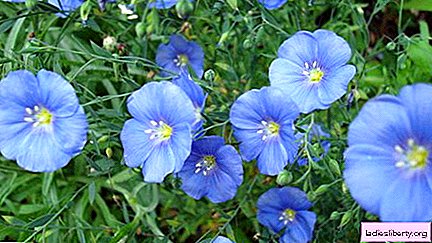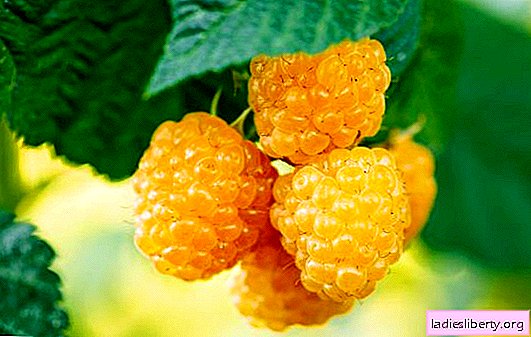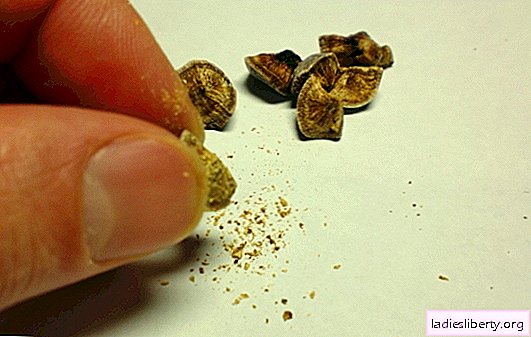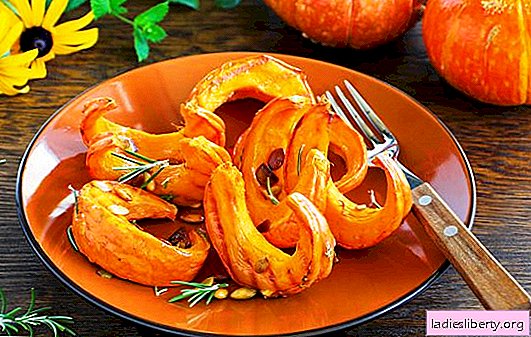
Linen - General Description
Annual or perennial flax is an herbaceous plant of the flax family with a high erect, and on top - branched, and thin stalk, reaching a height of 40 or more centimeters. The leaves are whole, narrow-lanceolate, sessile, arranged alternately, less often - the opposite.
Flax flowers collected in thyroid brushes, rather large, pale bluish, blue, yellow or white, develop on long pedicels. As a rule, they have five correctly teardrop-shaped and tender petals, touching at the edges with each other. Flax begins to bloom in late May - early June. The fruit is an ovoid or rounded capsule with flat oil seeds.
Flax - types and places of growth
The genus represents over 200 varieties of flax growing in the temperate and subtropical zones of the entire globe. The most popular in the agricultural textile industry was ordinary flax, characterized by a large abundance of subspecies, of which only three have the greatest cultural value:
- Mediterranean subspecies of flax - grown in the Crimea, Ukraine, Kazakhstan and the Caucasus as an oilseed;
- intermediate subspecies - widespread in the Mediterranean countries;
- Eurasian subspecies - includes, perhaps, the most cultivated crops scattered throughout the continent of Eurasia. Of the greatest importance of them are: flax flax, oil flax (or curly), flax, and flax creeping. The listed species are used for the production of fiber and seeds, and the flax is grown for further processing into oil.
In decorative floriculture, 25 types of flax are used: flax, large-flowered, stiffly hairy, perennial and others. They live in natural conditions, demanding light, achieve better development in moist and fertile soils.
Flax - healing properties
Flax is a plant used not only for the production of tissue and oil, it is also widely used in folk medicine and homeopathy. Flax seeds have concentrated a whole treasure of nutrients. Flax contains in its composition vegetable proteins, fiber, trace elements and the most important vitamins A, E, B, F, and essential polyunsaturated fats.
The unique composition of the seeds determines their beneficial effect on the body and the treatment of such ailments and pathologies as diabetes mellitus, cardiovascular diseases (it has been experimentally proved that flax normalizes A / D, lowers low blood cholesterol, eliminates arrhythmia and reduces the risk of heart attack, stroke and sudden cardiac death), stress, burns, ulcers, gastrointestinal and genitourinary diseases, neuralgia, etc.
In addition, flax improves immunity, has a beneficial effect on brain activity, eliminates constipation, neutralizes food poisoning, and mucus from seeds helps with poisoning by acids and other chemicals.
Flax - dosage forms
For medicinal purposes, only flaxseeds are used, which are collected as they form, that is, in September, when threshing flax. The collected raw materials are dried under a canopy, in dryers or in an oven at 30-40 degrees. Flaxseed oil is also extracted from seeds by cold pressing. In folk medicine, flax is used to prepare mucus, decoctions, infusions, compresses, poultices, etc. The range of possible applications is unusually wide.
Flax - traditional medicine recipes
Mucus recipe: a tablespoon of seeds a glass of boiling water; insist an hour, shaking occasionally, then cool, strain and drink two tablespoons each. 3-5 p. a day before meals (half an hour).
Decoction for oncological diseases: flax (3 tbsp. L. Seeds) add to boiling water - 600 ml and simmer over low heat for ten minutes. Then squeeze the raw materials and take the broth three times a day for half a glass.
For nephritis, urolithiasis: 1 teaspoon of seeds is added to boiling water (200 ml), boiled for only 2-3 minutes, then insisted for an hour and filtered. Use a glass in the morning and at night.
Skin diseases are treated with poultices, mucus and any of the listed decoctions, in the form of lotions. Decoctions are also used for enemas for hemorrhoids, inflammation of the intestine, dysentery and constipation, rinsing of an ulcerated oral cavity and inflamed tonsils.
Flax - contraindications
Flax is safe, but eating its seeds should be accompanied by a plentiful drink, since the rough structure of the seed without moisture can cause intestinal obstruction.
Comments











